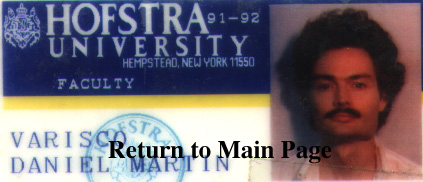
-
- Prof.
Varisco
- Anthropology
Classes
- socdmv@hofstra.edu
-
- If you are interested in getting the
most out of a course and the best grade possible, the keys are
in improving your study habits and communication skills.
Everyone inevitably has an individual approach, but here are a
few general suggestions that may be useful for you. As a
professor, I do not see how you could seriously follow these
guidelines and not receive a better grade in the class.
-
- READING
-
- 1. Read the assignment on time (or ahead of time). My
lectures assume you have read the material. I will not
regurgitate what you read, but I will try to highlight important
or interesting points and explore these points with you in class.
-
- 2. Highlight the important points of what you read before
you come to class. Unless you have a photographic memory, try
some of the following ways to better find and remember the points:
- • Underline or highlight important passages in your
text and write a keyword or concept in the margin; this will
really help when you prepare for exams.
- • Stick post-its on the relevant pages and note key
words or concepts; this is one way to make notes and not leave
marks in your book, if you plan to resell it.
- • For each reading, write the following on a separate
sheet of paper or in a notebook:
- • key concepts (with short definition or summary),
- • key people or scholars mentioned (know why they
are important)
• short summary of main points. Some texts already do
this for you at the end of the chapter or section.
-
3. For each reading, note points that you find confusing,
disagree with, or would like more information about. Bring
these up in class at the appropriate time, or come and see the
professor to discuss these.
-
- 4. Approach your reading or assignment with a critical
eye. By this, I mean you should ask yourself the following
questions:
- • What are the qualifications of the author to make
these points? Is he/she discussing her/his own work or
summarizing what someone else said?
- • What is the style of the author? Does it rely on
documented research or does it make a lot of claims that are
not backed up? Do you think the author has an open mind and
really wants to get to the truth or is there an ax to
grind?
- • Does the author seem to contradict himself/herself?
Are their statements or ideas that seem unfounded to you?
- • When was the book or article written? Is the
information possibly out of date? Does the writing tell us
something about the time in which it was written, even if the
information is no longer "valid"?
-
- CLASS
NOTES
-
- 1. In taking notes, it is important to decide when and how
much. It would be absurd to write down everything a professor
says in a class lecture. It is just as absurd to write nothing
down and rely solely on your memory (which tends to wander in even
the best lectures).
-
- 2. Your class notes should record the general drift or
outline of the class lecture and discussion. A few key words
or ideas may be sufficient to prod your memory later on.
-
- 3. Since I do not regurgitate your reading, my lecture is
not a substitute for what you read. You will not be able to
summarize your reading by relying primarily on what I say in
class.
-
- 4. Take notes when I go over important points, concepts,
or individuals and when I focus on what I think are difficult or
confusing parts of the reading. Relax and let your mind
engage when there is a class discussion.
-
- 5. I sometimes show films in class. These are not for
entertainment, but to visually supplement the ideas of the reading
and lecture. I suggest you do take notes of the important
points in the film. (If the classroom is too dark, let me
know.)
-
- ORAL PARTICIPATION IN
CLASS
-
- 1. I encourage you to participate in class in a number of
ways:
- • Respond with whatever you already know to direct
questions (I like the "Socratic" method).
- • Bring up points you find difficult or
confusing.
- • Introduce information you have or know that
supplements the ideas being discussed in class.
- • Bring up points you are excited about or strongly
disagree with.
-
- 2. Many of you are "shy" in class, but you communicate fine
with friends or in my office. Treat the class as a way to help
overcome your shyness. Don't worry that your question might sound
"stupid." Don't be intimidated by the professor (me) or other
students. Feel free to say what you really think, as long as it
is civil and respectful of other people's right to say what they
think.
-
- 3. Your participation in class discussion is a good way of
showing your interest in the class. Don't worry about
monopolizing the class time. It's my job to be the moderator to
make sure that doesn't happen.
-
- STUDYING FOR
EXAMS
-
- 1. Read the exam study-sheet very carefully. I
provide you with an indication of the important concepts and ideas
you will be tested on. I also provide all essay questions in
advance. If you are not clear what the question is about, ask for
clarification.
-
- 2. For essays, consider the following:
- • Prepare for these by re-reading the relevant
material and reviewing the relevant notes
(informative notes on your readings will be of great help
here).
- • Outline the main points you need to communicate and
then find relevant support (examples, cases, etc.) from the
course material that illustrate these points.
- • Be synthetic. Do not simply paraphrase something
you read in one source. Use as wide a variety of relevant
information as you can. When possible, relate your points to
something else you have already learned in the course.
- • To make a stronger essay, think about how it could
be criticized. Anticipate the weak points as you write
it.
-
- 3. On the use of quotes:
- As a general rule, DO NOT USE QUOTES from the readings. For
my classes, never use quotes to give descriptive data; if this is
relevant to your argument, put it in your own words. You may use
brief quotes (such as outrageous or provocative statements) that
you are responding to at length. Make sure the entire quoted
material is set off by quotation marks and cited in some
appropriate way. I am not interested in your editorial ability to
link quotes together.
-
- 4. I will not tolerate plagiarism of any kind. You are
encouraged to read the Hofstra Guidelines on plagiarism.
Plagiarism (which includes paraphrasing from a reading) will
result in an automatic zero for the assignment. Plagiarism or
direct borrowing on a take-home essay may result in an F for the
course.
-
-
- SEEING THE
PROFESSOR
-
- 1. Your tuition is not simply for sitting in a class several
times a week. As a professor, I set aside time in my office to
meet with students. I will also make appointments outside the
scheduled office hours.
-
- 2. If you have a problem understanding the course material or
doing the assignments, you need to talk with me as soon as
possible. If you do poorly on assignments or exams, you need to
talk with me about them so that you can improve. If you just want
to talk about course ideas, you should also drop by. The more
interaction I have with you, the better I can help you.
-
- 3. I am interested in your communication skills, so feel free
to ask for advice on doing your written assignments or oral
presentations. Whenever possible I will read drafts of written
material (except for exam essays) and offer comments.
-
-
-
-

